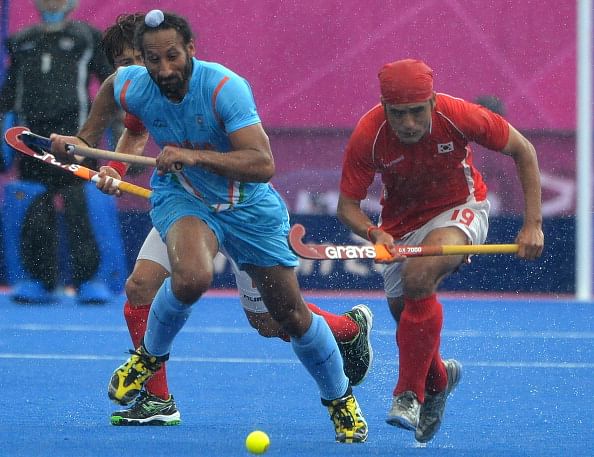
"We kept repeating the same mistakes in Olympics" - Sardar Singh interview
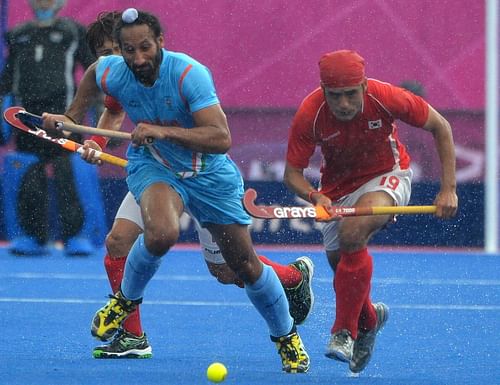
It’s not difficult to reach Shanthi Sagar Hockey stadium in Bangalore, where the Men’s Senior National Hockey Championship recently concluded. With sprinklers on, it sits out from its surroundings. As I navigate around to reach the main entrance, I find a few bystanders watching the proceedings from the boundary wall. Entering the stadium, it’s much different from the experience of shoving and pushing to get to the Chinnaswamy stadium for Indian cricket team’s match. After crossing the main hall into the open, the green turf presents itself in full view, with the distinct sound of the ball scurrying on it.
I wait for the match to get over, before having a tête-à-tête with the star midfielder. He stands out in the midfield – tall and all muscles compared to the majority of the players in the middle. One remembers his pre-Olympics comment where he stated that in case the Indian team does perform well, the players will be celebrating by showing off their newly acquired six-pack abs, a testimony to the hard work of not just the players, but coach Michael Nobbs and trainer David John. After some post-match exercises, he joins me for a conversation.
Congratulations for the Arjuna Award and for being named the brand ambassador of the Hockey India League along with Jamie Dwyer. What are your expectations from this league after WSH?
Thank you! First of all, I’d like to thank Hockey India for this venture. The best part about this league is that whoever is participating in this league, are presently playing for their respective national teams. It’s natural that when Indian players play with the best players in the world like Jamie Dwyer (Australia) and Teun de Nooijer (Netherlands), and spend time with them, they’ll learn much from these greats and it’ll also help when we face them at international level.
Talking about Olympics, it was a big disappointment. Going into it, you were in good form and had been declared the player of the tournament quite a few times. What did you feel after the worst finish for the team?
Definitely, ever since coach Michael Nobbs and trainer David John took over the helm, the team had been really performing well, be it the Olympic Qualifiers, Sultan Azlan Shah or some other practice tours. The expectations from all hockey lovers in India sky-rocketed, and we had some good performances to show just before the Olympics in the tri-nation series between Spain, England and India. But the problem in Olympics was that from the start till the end, we repeated the same mistakes.
First of all, the man-to-man marking was not up to the mark and then, we weren’t as aggressive in the ‘D’ as we would’ve wanted. The ball was being pushed from the wings but the forwards were unable to get a touch on it to deflect it in. If we would’ve scored those timely goals, I think the result of the tournament would’ve been totally different.
Michael Nobbs has declared you as the ‘best player’ in the team repeatedly. Don’t you think the team is overly dependent on a single player?
Apart from the team trainings, I also practice on my own a lot. I know my weaknesses. After the team practice, I ensure that I spend at least an hour on the ground for my individual training too. I think the rest of the players are performing well, but they will have to be mentally tougher. In the upcoming camps, we’ll have to train to perform better as a unit. We’ll have to develop specific areas like trapping the ball in the air, man-to-man marking and other mistakes which were there in the Olympics. We’ll get together and iron out these mistakes, watch the videos and ensure that we don’t repeat them in Champions Trophy, which is our next tournament.
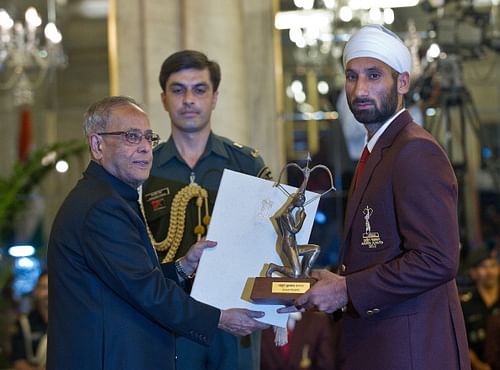
Sardar Singh receives the Arjuna Award 2012 from the President
You won the Arjuna Award, were declared ‘Player of the tournament’ on many occasions, are the brand ambassador of HIL, and suffered the Olympics disappointment. How has this year been for you individually?
It’s been quite a good year for me. I would like to thank my teammates, coach and the staff first of all, since hockey is a team game, and my family and my brother Didar Singh as they’ve had a big contribution in all the success I’ve had. Also, my individual training has been instrumental in winning the Arjuna award, being the ‘player of the tournament’, or named in FIH’s all-star team twice. But I’m not satisfied yet. In the coming tournaments, I wish to do much better for India and give it my best.
You earlier said in an interview that you almost quit hockey in 2005. What happened then and how did you make your comeback?
I was new to the junior team when we came to Bangalore to practice for the 4-nation tournament in Pakistan in 2004. The atmosphere there is quite like India – the Lahore ground was packed with spectators. I was played center-forward and I couldn’t even get a touch on the ball once in the whole match. I sat down later and thought that hockey’s very difficult and requires extreme levels of fitness, and I’m not good enough for it. I had almost made the decision to go out of the country and get settled somewhere. But then I attended many camps, around 10-15, some 1 month or 45 days long; I met many good players and learnt from them. Then, in 2006, I was selected in the senior team and then started my individual training. And as I said earlier, it was due to the well wishes of my family and friends, that I was able to make a comeback.
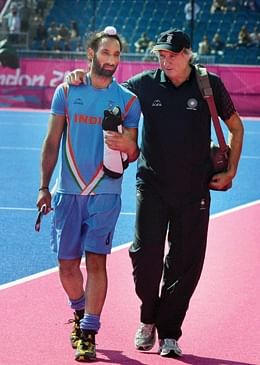 Talking about fitness, what has been the biggest change brought in the Indian team by Michael Nobbs and David John?
Talking about fitness, what has been the biggest change brought in the Indian team by Michael Nobbs and David John?
I think that in modern hockey, the players have to be at the peak of their fitness, both physically and mentally. Nobbs and David John have sketched separate training regimes for the full-backs, half-backs or forwards. We had a training session in Bangalore, where we solely focused on weight training. I think this Indian team is much fitter than its predecessors. In the upcoming camp in Patiala, from 15th October, we’ll need to work really hard if we dream of being among the top 5 teams of the world.
Michael Nobbs stated earlier that players were not implementing what was practiced and discussed in trainings. Do you think there’s any kind of communication gap between the players and the coach?
No I don’t think so. Agreed, that we have some players who have difficulty in understanding English, but we have people like our assistant coach Mohammed Riaz, a former Olympian himself, who help in translating too. Coach’s plan used to be perfect in the meetings, but like I said earlier, we weren’t able to get a deflection to the crosses from the wing and were found wanting in the man-to-man marking too. We repeated the same mistakes right from the first match till our last and the team had to take the fall for that.
Losing all the matches at Olympics; how was the atmosphere and coach’s reaction in the camp in those times?
Before Olympics, we trained very hard, being away from our families for long durations. Nobody wants to lose. But we kept on doing the same mistakes and it becomes very difficult for a team to keep going on after facing defeat after defeat. Still, the team atmosphere was fine and I hope that in the upcoming Champions Trophy in December, where the best teams of the world will be participating, we are able to show that we can be the best and not repeat the same mistakes we made in Olympics.
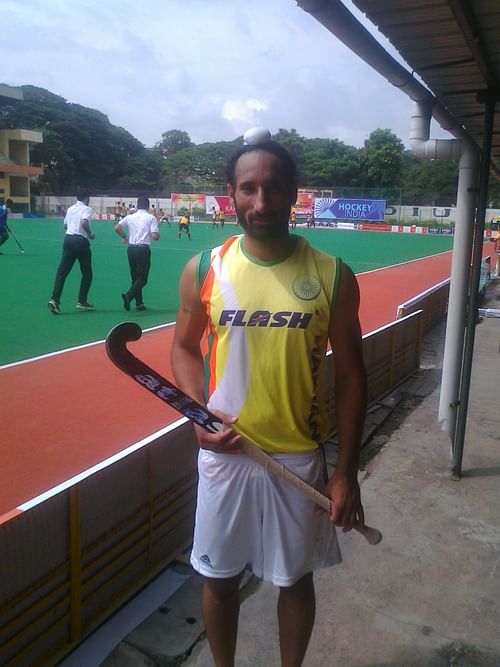 Azlan Shah has been the most successful tournament. From being the youngest captain for India in 2008, to winning the ‘Player of the tournament’ in 2010 and 2012, will you call it as your ‘favourite’ tournament?
Azlan Shah has been the most successful tournament. From being the youngest captain for India in 2008, to winning the ‘Player of the tournament’ in 2010 and 2012, will you call it as your ‘favourite’ tournament?
Definitely, this was where I made a comeback in 2006, and we won the Bronze medal. It’s a very lucky tournament for me. Being declared ‘Player of the tournament’, more than anything else, helps in self-motivation. And I hope I keep performing the best for my country.
After the Olympics, what is going to be different in the team’s approach from before?
We’ve had a month long break from hockey and have a camp from 15th October. We’ll see what the coaches have planned ahead. Right now, our only focus is to train hard and not repeat the same mistakes we made in Olympics. The next tournament is Champions Trophy and I think it’s better to forget what’s happened and do better in the future.
What would you like to say about David John? How has he contributed in the team?
I really would like to thank him as he’s been instrumental in the increase of fitness level for the team. Personally, now I find it easier to dodge 2-3 opponents as the ball reaches me. I hope he continues with the team as his contribution has been immense.
Coming to Penalty Corners, it was a mini-disaster for India as we failed to convert even the rare opportunities we got, and it hurt India badly. How would you rate the performances of our Penalty Corner experts?
See, I think Sandeep Singh and V.R. Raghunath, they have won India matches by scoring on many crucial occasions prior to Olympics. They scored against good teams and I think it was simply bad luck for them in London. They tried their best but unluckily, failed to convert many.
We failed to grab possession for the majority of the tournament. What was the team plan going into the matches? Did we focus too much on counter-attacking?
Our initial plan was to sit back and hold during the first 10 minutes or so of the match, and then take the attack to opposition. But then, when you’re losing, it’s the opponent team which comes at you harder and you get less and less chances to go ahead. If we had been successful at trapping the balls being passed to us in the opponent’s D and converted them, it would have changed the complexion of the game.
You’ve had experience of playing in the foreign leagues. How would you compare that with the domestic hockey being played in India?
Yes, I’ve played in the German league and in Belgium too. Their strongest point is that they play the same level of hockey, be it ‘B’ or ‘C’ division, and carry forward that same level of hockey in the national team too. The more we play with them, the more we’ll learn about their level of hockey and make our game better.
Like if you see here, when the ball comes to you, you don’t have to look up to see your marker coming towards you. Here, you can easily collect the ball and pass it forward without much difficulty. In today’s hockey at international level, when the ball comes to you, there are always 2-3 players from the opposition putting pressure on you, trying to dispossess you and they never give you time to think. This is why I think that with more engagement with international teams, we’ll be able to take the level of our game higher. Hockey India League, in this respect, is in the best interest of Indian hockey. The one month that our domestic players are going to spend with the foreign players, will be a learning curve for them and beneficial for the Indian team in long term.
How was your experience on the different blue turfs in London, Malaysia and Santander?
Apart from the colour change, I don’t think there’s much difference there. Only thing was that it was a newly laid turf and thus, was a bit heavy and playing on it required extra strength to pass the ball which was a bit more strenuous on players’ muscles. Apart from that, there wasn’t much change and we had ample practice on it going into the Olympics. Yes, the one in Spain was a bit faster than the one in London and latter required more effort, but I guess it was the same for all the teams. I believe our result was only due to the mistakes we made and blaming the pitch is no excuse for us. Our trapping, man-to-man marking and failing to convert chances were the actual reason for our dismal performance.
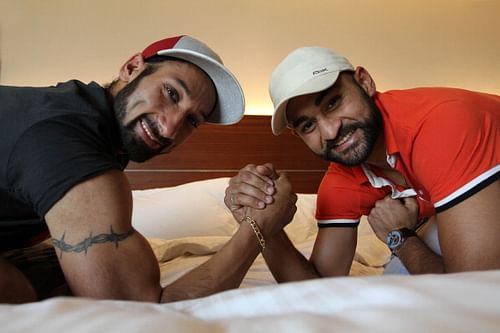
You share a strong bond with Sandeep Singh and he’s said that you two are ‘more than just brothers’. Personally, were you disappointed with his performance?
We have been together for 10-12 years now and it’s been a great partnership on the field. London was an unlucky tournament for him but I hope that he comes back stronger. In 2 years there’s World Cup, and there are Asian Games and Commonwealth Games too. I will be hoping that he makes a comeback and scores goals for India which he has done on so many occasions in the past and wins India more matches.
As we ended the conversation on an optimistic note, I felt proud to be with a player who has faced defeat, but came back stronger and dedicated his best to his country. The thing which strikes you the most while talking to Sardar Singh is that he never puts the blame on external factors for his or his team’s failures. There’s always a logical explanation for the mistakes made in the past and Sardar Singh is not the one to shy away from accepting them. He is not just India’s, but one of the world’s best players in hockey currently. At 26, he’s got much more to offer, and hopefully, it’ll result in capturing the lost glory for Indian Hockey.